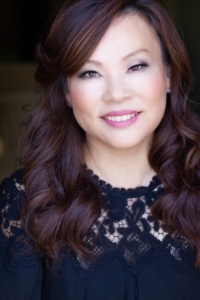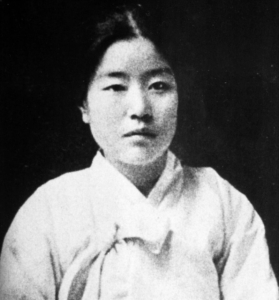The Doll’s House / Let’s go! To Paris not to live, but to die / No Need to Savor Youth
[translated poetry]
The Doll’s House (1921)
1
Playing with my doll
makes me happy and later
I become my father’s doll
and later my husband’s
I make them happy
I become their comfort
(Refrain)
Let Nora go
at last
graciously
from her prison
unlock the gate
let Nora go free
2
Like my responsibility
to my husband and my children
I have divine responsibility
to make myself human
to follow that path
to become human
3
My heart knows
without the taste of real human
from the walls torn down
worthless is my body
4
Oh, dear beloved daughters
look at me
devote yourselves with all your heart
a new day behind the rainstorm
will find you
and I
(Refrain)
Let Nora go
at last
graciously
from her prison
unlock the gate
let Nora go free
Let’s go! To Paris not to live, but to die (1935)
Let’s go! To Paris not to live, but to die
Paris killed me
Paris made me a real woman
Damn it, let me die in Paris!
Nothing to find, meet, or gain. No reason to return.
Forever I will go
Past and present, I am zero
I will be in the future
My four children!
Blame me not, but society, morals, laws, and customs
Your mother as a pioneer was a martyr of destiny
Someday you may come as ambassadors to Paris
Find my grave, leave one flower for me
No Need to Savor Youth (1935)
Her flesh is soft, soft
her skin radiant
her hair silky black
her eyes sparkling, sparkling
her ears astute
her words alive
her frame lean
her manner impulsive
like a sparrow
like a swallow
like a parrot
like a peacock
With age
her wrinkles show
her skin darkens
her hair grays
her hearing fades
her eyes dim
her speech slows
her body slouches
her gait stalls
like a giraffe
like a bear
like a buffalo
Gone are the many days
promised by youth
As old age comes
death is near
How do I not savor youth?
If youth was of the future,
But, youth is of the past
So, no use in what is lost
I was dreamy
fickle
brief
With age, I am
calmer
deeper
strong and patient
Let the reckless past be wasted
Well spent years forgotten
No need to savor youth
Let me welcome what comes with age.
![]()
인형의 가 (1921)
1
내가 인형을 가지고 놀 때
기뻐하듯
아버지의 딸인 인형으로
남편의 아내 인형으로
그들을 기쁘게 하는
위안물 되도다
(후렴))
노라를 놓아라
최후로 순순하게
엄밀히 막아논
장벽에서
견고히 닫혔던
문을 열고
노라를 놓아 주게
2
남편과 자식들에게 대한
의무같이
내게는 신성한 의무 있네
나를 사람으로 만드는
사명의 길로 밟아서
사람이 되고자
3
나는 안다 억제할 수 없는
내 마음에서
온통을 다 헐어 맛보이는
진정 사람을 제하고는
내 몸이 값없는 것을
내 이제 깨닫도다
4
아아 사랑하는 소녀들아
나를 보아
정성으로 몸을 바쳐다오
맑은 암흑 횡행(橫行)할지나
다른 날 폭풍우 뒤에
사람은 너와 나
(후렴)
노라를 놓아라
최후로 순순하게
엄밀히 막아 논
장벽에서
견고히 닫혔던
문을 열고
노라를 놓아 주게
가자! 파리로. 살러 가지 말고 죽으러 가자 (1935)
가자! 파리로. 살러 가지 말고 죽으러 가자
나를 죽인 곳은 파리다
나를 정말 여성으로 만들어준 곳도 파리다
나는 파리 가 죽으련다
찾을 것도, 만날 것도, 얻을 것도 없다
돌아올 것도 없다
영구히 가자
과거와 현재 공(空)인 나는 미래로 나가자
四남매 아해들아!
에미를 원망치 말고 사회제도와 도덕과 법률과 인습을 원망하라
네 에미는 과도기에 선각자로 그 운명의 줄에 희생된 자였더니라
후일, 외교관이 되어 파리 오거든
네 에미의 묘를 찾아 꽃 한 송이 꽂아다오
아껴 무엇하리, 청춘을 1935
살이 포근포근하고
빛은 윤택하고
머리가 까맣고
눈이 말뚱말뚱하고
귀가 빠르고
언어가 명랑하고
태도가 날씬하고
행동이 겸사하여
참새와도 같고
제비와도 같고
앵무와도 같고
공작과도 같다
나이 먹으면
주름살이 잡히고
빛깔이 검어지고
머리가 희어지고
귀가 어둡고
눈이 흐려지고
말이 어둔해지고
몸이 늘신해지고
행동이 느려져
기린과도 같고
곰과도 같고
물소와도 같다
이리하여
살 날이 많던
청춘은 가고
죽을 날이 가까운
노경에 이른다
이 어찌
청춘 감을
아끼지 않으랴
그러나 나는
장차 올 청춘이었던들
아꼈을는지 모르나
이미 간 청춘을
아끼지 않나니
청춘은
들떴었고
얕았었고
짧았던 것이오
나이 먹고 보니
침착해지고
깊고
두텁고
길다
청춘을
헛되이 보내었던들
아끼지 않을 바 아니나
빈틈없이 이용한 청춘을
아낄 무엇이 있으며
지난 청춘을
아껴 무엇하리오
장차 올 노경이나
잘 맞으려 하노라
Translator’s Statement
How do you break free from all the restrictions of culture in order to speak—and still embrace your art? Na Hye-sok did not follow anybody’s rules as she created astonishing works of literature and paintings. The reason I translated her poems from Korean to English is that I wanted to ensure that this poet, who was far ahead of her time, was not underestimated and misrepresented in our time and society. My early memory of Korean literature is of sadness, sorrow, longing, darkness, and loss, most especially from Korean women writers. Their lives usually end tragically. In school, we studied superficial aspects of literature, mainly to satisfy testing requirements. This was my impression: unhappy women become writers and they end up having sad lives. The message was: if you speak, if you use your voice, your life will be miserable, and you will probably be punished. In fact, parents and teachers would scold young writers this way using Na Hye-sok as an example: “Do you want to become another Na Hye-sok?” It is now time for me to bring her into the light and show how she blazed the trail for us. Her poem writing was directed towards Korean women’s self-awakening. Na writes: “Isn’t it time for Korean women to be truly human beings? Shouldn’t we become real women?”
It is time for her to receive wider recognition for her work. The original work was written in Old Korean with lots of Chinese characters. It was an arduous translation process to translate Old Korean to modern Korean and find Chinese characters to approximate modern Korean. Then, I translated to English not just word by word, but I sought words close to the original meaning. The fact that I am fluent in Korean, learned Chinese, and I know how to find the meaning of Chinese characters was fundamental. Above that, knowing the history of Korea, Jung Shu정서 , Mah-Uhm마음, its culture and customs were essential to creating a meaningful translation. I know I am emotionally attached to Na Hye-sok and I feel I have to heighten western awareness of her revolutionary poetry. Her words echo in my ear, “Isn’t it about time Choson women (Korean women) lived like humans?” She was a pioneering woman who understood the need for equality, freedom, and rights. She wrote about them and was destroyed by her society. Na wrote this in her poem, “Let’s Go! To Paris Not to live, but to die”: “My four children! / Blame me not but society, morals, laws, and customs.” Her poems are the voices of silent Korean women in her life who have not yet been acknowledged. I feel this is my duty to introduce and share her poetry, which has never been translated into English to my knowledge, so it has become my mission as a Korean woman.
Tanya (Hyonhye) Ko Hong is an internationally published poet, translator, and cultural curator who champions bilingual poetry and poets. Born and raised in Suk Su Dong, South Korea, she immigrated to the US at the age of eighteen. She is the author of five books: The War Still Within (forthcoming from KYSO Flash Press, 2019), Mother to Myself: A collection of poems in Korean (Prunsasang Press, 2015), Yellow Flowers on a Rainy Day (Oma Books, 2003), Mother’s Diary of Generation (Qumran, 2002), and Generation One Point Five (Esprit 1993).
Her poetry appears in Rattle, Beloit Poetry Journal, Cultural Weekly, The Feminist Press, Lunch Ticket, great weather for MEDIA, Califragile, Choson Iibo, Korea Times, Korea Central Daily News, and the Aeolian Harp Series Anthology, among others. Tanya’s work has won the Yun Doon-ju Korean-American Literature Award, was a finalist in Frontier’s Chapbook Contest, and has been nominated for a Pushcart Prize. In 2015, her segmented poem “Comfort Woman” received an honorable mention from the Women’s National Book Association. In 2015 and 2018, she became the first person to translate and publish Arthur Sze’s poems in Korean.
Tanya holds an MFA degree from Antioch University in Los Angeles, CA, and is a PhD student in mythological studies at Pacifica Graduate Institute. She lives in southern California with her husband and three children.
Na Hye-sok (1886-1948) was a writer and painter from Korea. She was a pioneering Korean female writer and the first female artist to employ oil painting in Western style, educated in Tokyo Women’s Art College. At the beginning of her marriage to Kim U-Yong, a diplomat, Na traveled in Europe and the United States. She demonstrated that it could be possible for a woman to be able to follow her own literary and artistic pursuits while still satisfying her social obligation to marry and bear children. But her marriage failed, and her subsequent public romantic relationships were her undoing. She wrote and published two important and fearless essays concerning equality for women following her divorce, which outcast her from her own family, too. She was left to die alone in a public hospital. She was unacceptable in her day, but now in her hometown, Suwon, she is a legend, praised for being a pioneer artist among women. Her bravery has encouraged other women to aspire to artistic achievement.
The reason I translated her poems from Korean to English is that I wanted to ensure that this poet, who was far ahead of her time, would receive a wider recognition for her work. The original work was written in old Korean with lots of Chinese characters, which I translated to modern Korean first, then to English.






